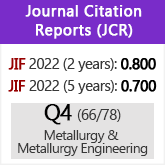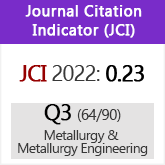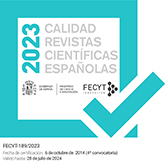Residual stresses generated in F-522 steel by different machining processes
DOI:
https://doi.org/10.3989/revmetalm.2005.v41.i4.214Keywords:
Residual stress, X-ray diffraction, turning, GrindingAbstract
Machining operations induce plastic deformation and heat generation in the near surface area of the machined part, giving rise to residual stresses. Depending on their magnitude and sign, these stresses can be detrimental or beneficial to the service life of the part. The final stress state depends on the machining process applied, as well as on the machining parameters. Therefore, the establishment of adequate machining guidelines requires the measurement of the residual stresses generated both at the surface and inside the material. In this work, the residual stresses generated in F-522 steel by two hard turning (conventional and laser assisted) and two grinding (production and finishing) processes were measured by X-ray diffraction. Additionally, depth profiles of the volume fraction of retained austenite, microstructure and nanohardness were obtained in order to correlate those results with the residual stress state obtained for each machining process. It has been observed that turning generates tensile stresses in the surface while grinding causes compressive stresses. Below the surface grinding generates weak tensile or nearly null stresses whereas turning generates strong compressive stresses. These results show that the optimum machining process (disregarding economical considerations) implies the combination of turning plus elimination of a small thickness by final grinding.
Downloads
Download data is not yet available.
Downloads
Published
2005-08-30
How to Cite
García-Navas, V., Ferreres, I., Marañón, J. A., García-Rosales, C., & Gil-Sevillano, J. (2005). Residual stresses generated in F-522 steel by different machining processes. Revista De Metalurgia, 41(4), 266–279. https://doi.org/10.3989/revmetalm.2005.v41.i4.214
Issue
Section
Articles
License
Copyright (c) 2005 Consejo Superior de Investigaciones Científicas (CSIC)

This work is licensed under a Creative Commons Attribution 4.0 International License.
© CSIC. Manuscripts published in both the printed and online versions of this Journal are the property of Consejo Superior de Investigaciones Científicas, and quoting this source is a requirement for any partial or full reproduction.All contents of this electronic edition, except where otherwise noted, are distributed under a “Creative Commons Attribution 4.0 International” (CC BY 4.0) License. You may read here the basic information and the legal text of the license. The indication of the CC BY 4.0 License must be expressly stated in this way when necessary.
Self-archiving in repositories, personal webpages or similar, of any version other than the published by the Editor, is not allowed.

















